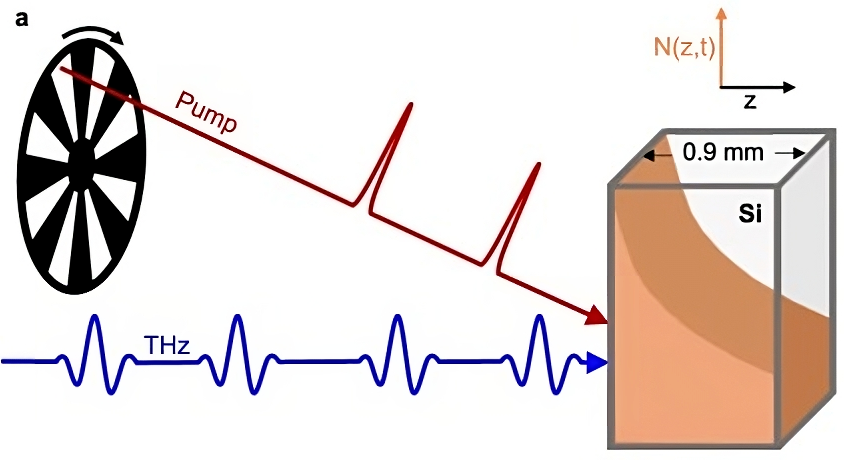
Image Credit: University of Ottawa
Electromagnetic waves, known as terahertz waves, have the ability to expose the mysteries of matter. They are capable of capturing quick changes in materials that are hidden from other radiation types. Researchers can now record real-time videos of hot electrons in silicon at 50,000 frames per second using terahertz waves, which is a quicker rate than ever before.
A group of researchers, led by Jean-Michel Ménard, an associate professor of physics at the Faculty of Science at the University of Ottawa, applied the chirped-pulse encoding and photonic time-stretch methods.
In the first method, a chirped supercontinuum in the optical region—which resembles a traveling rainbow—is imprinted with the information carried by a THz pulse.
The second slows down the pace of information so that it can be captured in real-time by sophisticated electronic apparatus by stretching the rainbow pulse in time inside a long fiber.
These stages are repeated using a train of pulses at 20-microsecond intervals that can be combined to create a movie of the low-energy dynamics inside a material.
In this study, we present a novel photonics system that can measure in real-time the low-energy dynamics of complex physical phenomena with a time resolution approaching the microsecond. Our setup is distinctive: it is a compact system that replaces a technology that was only accessible in large synchrotron facilities, and can quickly perform time-resolved THz spectroscopy, a powerful technique to analyze various materials.
Jean-Michel Ménard, Associate Professor, Physics, Faculty of Science, University of Ottawa
What’s Next?
Experiments using this technique will trace the vibrational resonances of molecules to investigate the perplexing role of enzymes in chemical reactions and discover unseen changes in living organisms when subjected to a sudden temperature increase.
Ménard added, “In condensed matter experiments, our rapid THz photonic system will be used to observe a range of non-reversible electronic or lattice reconfigurations, notably occurring during phase transitions. We anticipate that (this) will play a crucial role in revealing a new range of fast and non-reproducible processes rendering THz spectroscopy an even more efficient characterization tool to make impactful discoveries in materials physics.”
With the use of their photonic system, the researchers can now examine the behaviors of irreversible physical, chemical, and biological events, such as electronic transport in semiconductors, chemical exothermic reactions, and protein folding in biological organisms.
The current perception of the world is being permanently changed as it reveals the secret dance of rapid and surprising dynamics.
Other members of the research team include Nicolas Couture, Wei Cui, Rachel Ostic, Défi Junior Jubgang Fandio, Eeswar Kumar Yalavarthi, Aswin Vishnuradhan, and members of the Ultrafast THz group, as well as Angela Gamouras (research officer at the National Research Council Canada) Nicolas Y. Joly (of the Max Planck Institute for the Science of Light in Erlangen and the University of Erlangen-Nürnberg) and his Ph.D. student Markus Lippl.
The Max Planck-uOttawa Centre for Extreme and Quantum Photonics and the Joint Centre for Extreme Photonics (JCEP) also supported this study.
Journal Reference
Couture, N., et al. (2023) Single-pulse terahertz spectroscopy monitoring sub-millisecond time dynamics at a rate of 50 kHz. Nature Communications. doi:10.1038/s41467-023-38354-3.